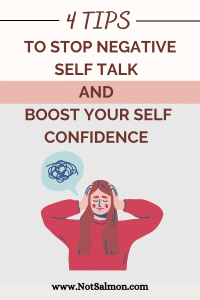 Here are some top tips to stop negative self talk and instead learn how to boost your self confidence with a more positive inner monologue.
Here are some top tips to stop negative self talk and instead learn how to boost your self confidence with a more positive inner monologue.
Ever stood in front of the mirror, hoping to feel a surge of confidence, but instead lots of negative self talk kicks, in saying: “You’re wearing that? Really?” Or maybe you’ve been in a meeting, thought of a great idea, but then that nagging voice whispers, “Remember the last time you spoke up? Wanna make a fool of yourself again?”
Unfortunately negative self-talk can be a snarky critic that never got the memo that not every thought needs vocalizing.
It’s like having a 24/7 radio show in your head, except the DJ is a jerk, and the playlist? Oh, just your most embarrassing memories and darkest fears on loop.
But, there’s hope.
Because understanding how your self talk works is half the battle. By identifying where this voice stems from and why it’s so hell-bent on undermining you, you stand a better chance at learning how to stop all the negative self-talk chatter.
I’m writing this article because I’m a leading Behavioral Change Expert and bestselling author of a few books on mastering self talk – like Think Happy and Happy Habits.
I’m also the founder of the research-based online program, The Anxiety Cure Online Course – which is therapist recommended.
I love to help people to live calmer, happier lives.
In this article, I will be delving deep into the roots of your internal heckler. I will be sharing some interesting insights into why your brain loves throwing shade at you. Plus I will be arming you with strategies to drown out the negative noise.
The Origins of Your Negative Self Talk Chatterbox
If you’re not careful your negative self-talk will drown out your feelings of joy and self-confidence. So where does this inner critic come from? Let’s dive into the four main roots of this toxic inner dialogue.
 1. Childhood Experiences and Upbringing
1. Childhood Experiences and Upbringing
Research Insights: Childhood can significantly shape our internal dialogue. Negative self-talk can come from past events we interpreted as children, particularly if we believed we were to blame for them.
For instance: Children who witness parents fighting might internalize it, believing it’s their fault.
Moreover: Consistent exposure to adult figures who demand perfection can instill a chronic fear of making mistakes or not being “good enough.”
Supporting Study: Georgina Sturmer, a mental health counselor, suggests that negative self-talk “might be a response to events that happened when we were young.” Children, still forming their understanding of the world, might internalize the turmoil around them.
2. Societal Pressures and Discrimination
Research Insights: Societal pressures to conform to certain standards can significantly influence our self-worth. Discrimination based on body size, race, or being marginalized in other ways is linked to chronic low self-esteem and, subsequently, negative self-talk.
Supporting Studies: Research published in the journal Childhood Obesity in January 2021 found that children with obesity who faced teasing or had low self-esteem were more prone to internalizing weight bias.
Additionally: The social comparison promoted by platforms like Facebook and Instagram can exacerbate feelings of inadequacy, as revealed by a September 2019 study in Telematics and Informatics.
3. Mental Health Challenges
 Research Insights: People managing mental illnesses, such as depression or PTSD, may be more prone to engage in self-critical thoughts.
Research Insights: People managing mental illnesses, such as depression or PTSD, may be more prone to engage in self-critical thoughts.
The effects: This negative self-talk can increase the symptoms of these conditions, creating a vicious cycle of deteriorating mental health and escalating self-criticism.
Supporting Insight: Cynthia Shaw, PsyD, points out the chicken-and-egg scenario where one’s mood dips due to self-criticism, leading to even more self-deprecation and further dampened spirits.
4. Social Media and Comparisons
Research Insights: Although social media can be a community-building tool, it’s also a breeding ground for negative self-talk.
The effects: The constant barrage of curated lives, achievements, and beauty-filtered images can amplify feelings of inadequacy and self-criticism.
Supporting Study: Research published in Telematics and Informatics in September 2019 linked the use of Facebook and Instagram to social comparisons and damaged self-esteem over time.
Now that you understand the roots of your inner critic, let’s look at some strategies to mute your negative inner monologue more effectively.
4 Tips to Stop Negative Self Talk
 If your brain had a boardroom, your inner critic would be that overly opinionated co-worker who just loves pointing out the typos in everyone’s emails.
If your brain had a boardroom, your inner critic would be that overly opinionated co-worker who just loves pointing out the typos in everyone’s emails.
So, how do you stop the constant negative self-talk and rediscover your confidence?
Coming up now I will explore the four top strategies that might just turn that inner critic into a somewhat supportive inner voice.
1. Increase Awareness: Becoming the Observer of Your Own Mind
You know that friend who never realizes they’re talking loudly in a quiet room? Well, negative self-talk can be a bit like that – present and blaring, yet unnoticed. The key is to turn up your internal volume and actually tune in.
How to Do It: Dedicate five minutes a day to sit in silence. Now, this isn’t some woo-woo meditation stuff. This is about mental eavesdropping. Listen to your thoughts. Don’t judge, just observe. You might be shocked to realize how many times you mentally call yourself a klutz or berate yourself over minor missteps. Recognizing these patterns is the first step to rewriting them.
2. Challenge and Re-Evaluate Thoughts: Putting That Inner Critic on Trial
Your inner critic loves making bold claims without evidence. “You’ll never get that job!” “You’re terrible at relationships!” Well, it’s time for a cross-examination.
How to Do It: Every time you catch a negative thought, play detective. What evidence do you have to support this thought? Usually, you’ll find it’s built on shaky ground. For instance, maybe you think you’re bad at relationships because of a past breakup. But what about all those other relationships – friendships, family ties – where you shine? By poking holes in your inner critic’s arguments, you diminish its power.
3. Use Visualization Techniques: Giving Form to the Formless
The brain is a visual creature. It loves images, and sometimes, giving shape to a thought can weaken its grip.
How to Do It: Picture the negative thought as something tangible – perhaps a dark cloud or a pesky bug. Now, imagine blowing that cloud away or swatting that bug. Alternatively, imagine your negative thought written on a whiteboard. See yourself picking up an eraser and wiping it away. By giving your thought a form and then actively dismissing it, you’re signaling to your brain that it doesn’t hold power over you.
4. Repeat Positive Affirmations: The Power of Mental Mantras
 Yes, it might seem a tad cliché. And no, chanting “I am the king/queen of the world” won’t suddenly make you royalty. But here’s the scoop: The brain believes what it hears frequently. So, why not feed it some positive vibes?
Yes, it might seem a tad cliché. And no, chanting “I am the king/queen of the world” won’t suddenly make you royalty. But here’s the scoop: The brain believes what it hears frequently. So, why not feed it some positive vibes?
How to Do It: Create a list of positive, empowering statements about yourself. Things like “I am capable,” “I handle challenges with grace,” or even “I rock my own brand of cool.” Repeat these affirmations daily. Say them out loud if you can. The trick is repetition – the more you say them, the more they’ll replace those gnarly negative narratives.
Conclusion: Stopping Negative Self Talk
If your negative self talk is mucking up your life mojo, maybe it’s time to chat with a Mindset Mastery Coach – like myself. I encourage you to explore my 1 on 1 Zoom Mindset Mastery Sessions. I will help you to flip your inner script – so you start to chat with with yourself in a far more positive way.
Think happier. Think calmer.
Think about subscribing for free weekly tools here.
No SPAM, ever! Read the Privacy Policy for more information.
One last step!
Please go to your inbox and click the confirmation link we just emailed you so you can start to get your free weekly NotSalmon Happiness Tools! Plus, you’ll immediately receive a chunklette of Karen’s bestselling Bounce Back Book!


 Here are some top tips to stop negative self talk and instead learn how to boost your self confidence with a more positive inner monologue.
Here are some top tips to stop negative self talk and instead learn how to boost your self confidence with a more positive inner monologue. 1. Childhood Experiences and Upbringing
1. Childhood Experiences and Upbringing Research Insights: People managing mental illnesses, such as depression or PTSD, may be more prone to engage in self-critical thoughts.
Research Insights: People managing mental illnesses, such as depression or PTSD, may be more prone to engage in self-critical thoughts. If your brain had a boardroom, your inner critic would be that overly opinionated co-worker who just loves pointing out the typos in everyone’s emails.
If your brain had a boardroom, your inner critic would be that overly opinionated co-worker who just loves pointing out the typos in everyone’s emails. Yes, it might seem a tad cliché. And no, chanting “I am the king/queen of the world” won’t suddenly make you royalty. But here’s the scoop: The brain believes what it hears frequently. So, why not feed it some positive vibes?
Yes, it might seem a tad cliché. And no, chanting “I am the king/queen of the world” won’t suddenly make you royalty. But here’s the scoop: The brain believes what it hears frequently. So, why not feed it some positive vibes?